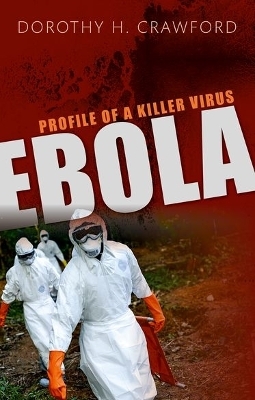
Ebola
Profile of a Killer Virus
Seiten
2016
Oxford University Press (Verlag)
978-0-19-875999-7 (ISBN)
Oxford University Press (Verlag)
978-0-19-875999-7 (ISBN)
Ebola is a compelling account of the recent terrible epidemic which swept through West Africa. Why did it spread; what was the international response; what is the long-term impact; what lessons can be learned for the future? This book combines the latest scientific insights with personal accounts from medical workers.
First discovered in 1976, and long regarded as an easily manageable virus affecting isolated rural communities, Ebola rocketed to world prominence in 2014 as a deadly epidemic swept through Guinea, Sierra Leone, and Liberia in West Africa. Thousands of people died as the extraordinarily contagious disease spread rapidly from villages to urban centres. Initial quarantine responses proved often too little and too late, and the medical infrastructure of the affected countries struggled to cope. By August 2014, several months after the start of the outbreak, the WHO declared the epidemic a public health emergency and international aid teams and volunteers began to pour in. But halting the epidemic proved to be hugely challenging, not only in terms of the practicalities of dealing with the sheer numbers of patients carrying the highly infectious virus, but in dealing with social and cultural barriers. The author, Dorothy Crawford, visited Sierra Leone while the epidemic was ongoing and met with those on the frontline in the fight against the virus.
In Ebola Crawford combines personal accounts from these brave medical workers with the latest scientific reports to tell the story of the epidemic as it unfolded, and how it has changed our understanding of the virus. She looks at its origin and spread, the international response, and its devastating legacy to the health of those living in the three worst affected countries. She describes the efforts to prevent international spread, the treatment options for Ebola, including the drug and vaccine trials that eventually got underway in 2015, and the sensitive issue of running trials of experimental therapies during a lethal epidemic. Our understanding of the Ebola virus continues to develop as long-term health problems and complications following recovery from the disease are being identified. Epidemics of Ebola or other dangerous microbes will continue to threaten the world regularly. Already concerns have been raised by the possible impact of the Zika virus. What lessons have been learnt from Ebola? How, asks Crawford, might we prevent a repeat of the awful suffering seen in 2014-16?
First discovered in 1976, and long regarded as an easily manageable virus affecting isolated rural communities, Ebola rocketed to world prominence in 2014 as a deadly epidemic swept through Guinea, Sierra Leone, and Liberia in West Africa. Thousands of people died as the extraordinarily contagious disease spread rapidly from villages to urban centres. Initial quarantine responses proved often too little and too late, and the medical infrastructure of the affected countries struggled to cope. By August 2014, several months after the start of the outbreak, the WHO declared the epidemic a public health emergency and international aid teams and volunteers began to pour in. But halting the epidemic proved to be hugely challenging, not only in terms of the practicalities of dealing with the sheer numbers of patients carrying the highly infectious virus, but in dealing with social and cultural barriers. The author, Dorothy Crawford, visited Sierra Leone while the epidemic was ongoing and met with those on the frontline in the fight against the virus.
In Ebola Crawford combines personal accounts from these brave medical workers with the latest scientific reports to tell the story of the epidemic as it unfolded, and how it has changed our understanding of the virus. She looks at its origin and spread, the international response, and its devastating legacy to the health of those living in the three worst affected countries. She describes the efforts to prevent international spread, the treatment options for Ebola, including the drug and vaccine trials that eventually got underway in 2015, and the sensitive issue of running trials of experimental therapies during a lethal epidemic. Our understanding of the Ebola virus continues to develop as long-term health problems and complications following recovery from the disease are being identified. Epidemics of Ebola or other dangerous microbes will continue to threaten the world regularly. Already concerns have been raised by the possible impact of the Zika virus. What lessons have been learnt from Ebola? How, asks Crawford, might we prevent a repeat of the awful suffering seen in 2014-16?
Dorothy H Crawford was professor of medical microbiology at the University of Edinburgh from 1997-2010 and assistant principal for public understanding of medicine from 2005-2011. She was elected Fellow of the Royal Society of Edinburgh and of the Academy of Medical Sciences in 2001 and received an OBE for services to medicine and higher education in 2005. She is the author of The Invisible Enemy (OUP, 2000); Deadly Companions (OUP, 2007); Virus hunt (OUP, 2013); and Viruses VSI (OUP, 2011).
ENDNOTES; INDEX
| Erscheinungsdatum | 01.11.2016 |
|---|---|
| Zusatzinfo | 14 black and white images |
| Verlagsort | Oxford |
| Sprache | englisch |
| Maße | 143 x 222 mm |
| Gewicht | 354 g |
| Themenwelt | Sachbuch/Ratgeber ► Natur / Technik |
| Studium ► Querschnittsbereiche ► Epidemiologie / Med. Biometrie | |
| Studium ► Querschnittsbereiche ► Infektiologie / Immunologie | |
| Studium ► Querschnittsbereiche ► Prävention / Gesundheitsförderung | |
| Sozialwissenschaften ► Pädagogik ► Sozialpädagogik | |
| Sozialwissenschaften ► Soziologie | |
| Wirtschaft | |
| ISBN-10 | 0-19-875999-1 / 0198759991 |
| ISBN-13 | 978-0-19-875999-7 / 9780198759997 |
| Zustand | Neuware |
| Haben Sie eine Frage zum Produkt? |
Mehr entdecken
aus dem Bereich
aus dem Bereich
ein überfälliges Gespräch zu einer Pandemie, die nicht die letzte …
Buch | Hardcover (2024)
Ullstein Buchverlage
CHF 34,95


